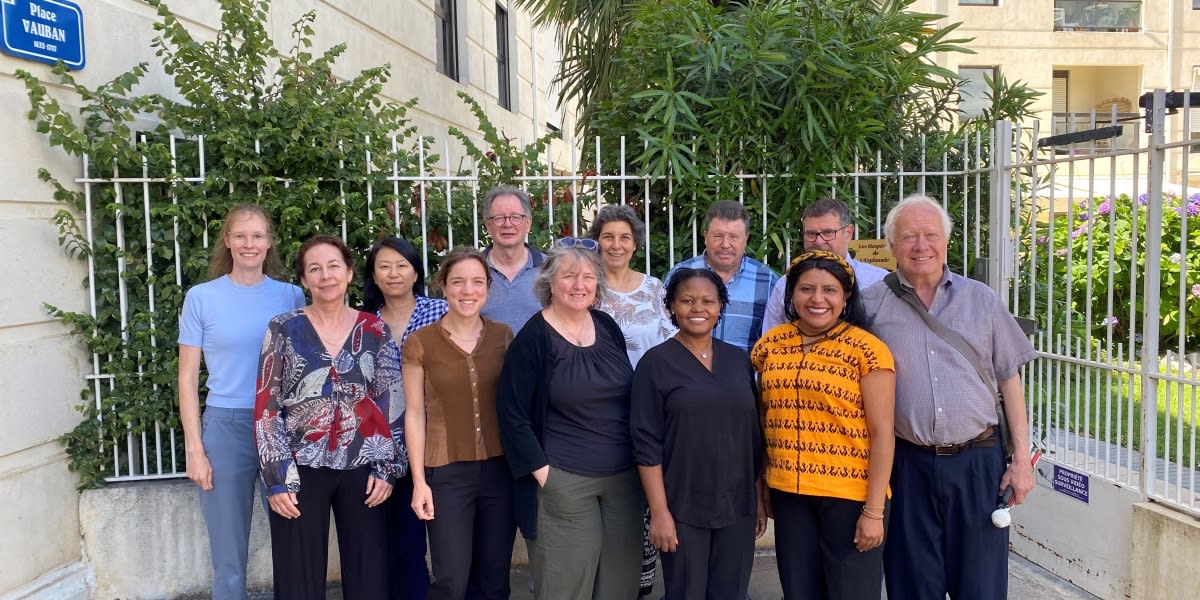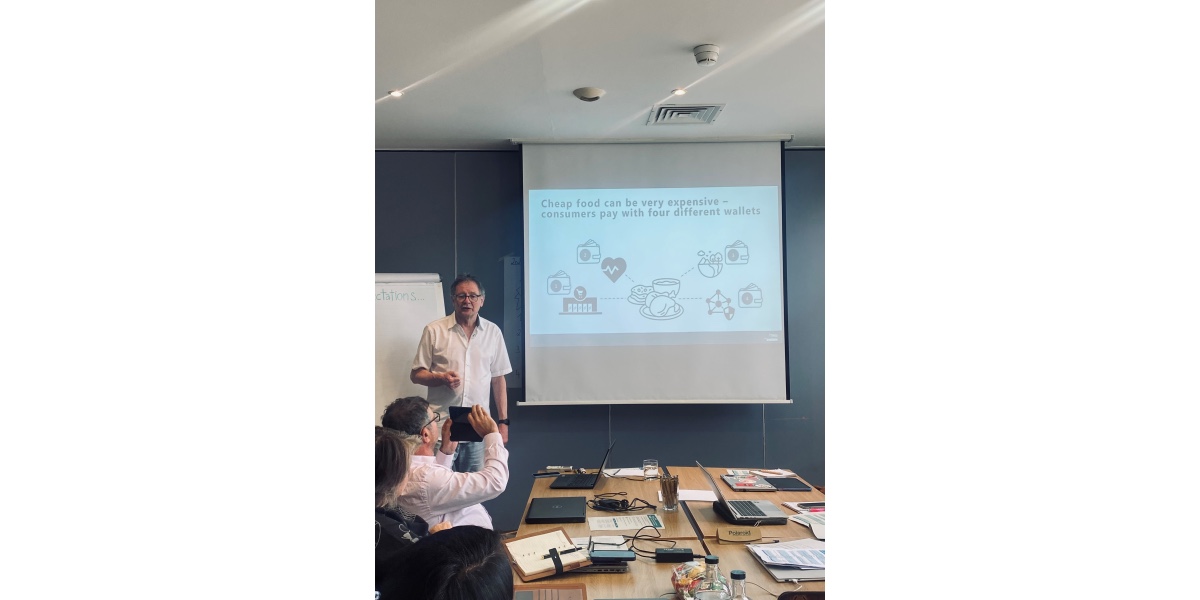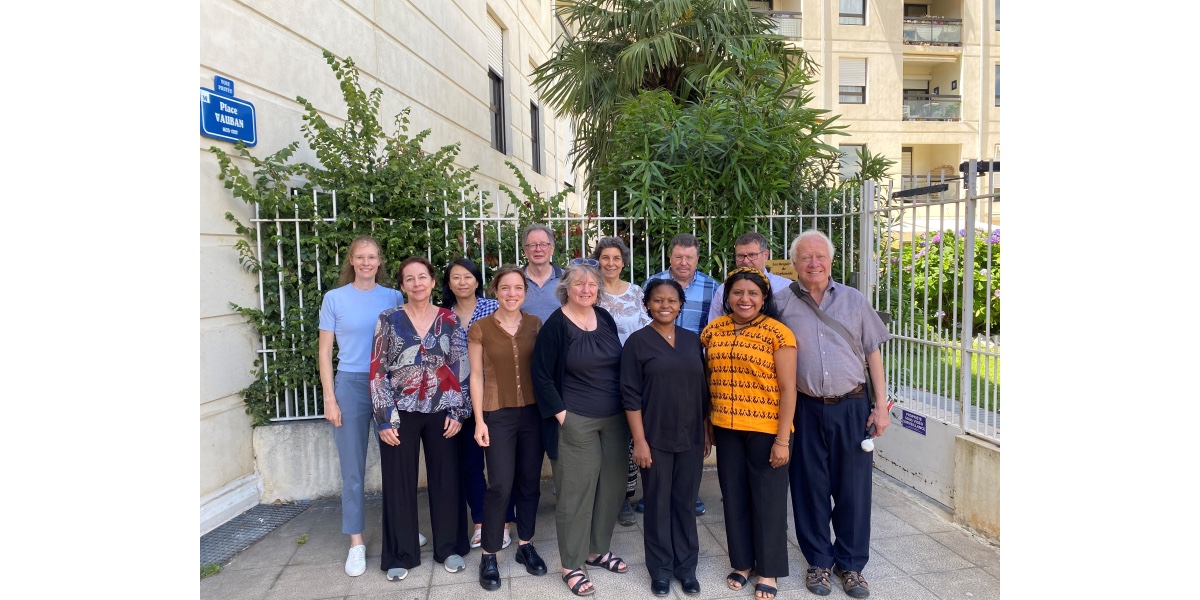How can True Cost Accounting support the transformation of food systems in times of multiple crises?
Summary of the workshop convened by the Expert Advisory Group of the project Assessment and Communication of Climate Impacts of Food (CLIF) in France.
by Lisa Klaus, Olivia Riemer | 2024-07-08

The Expert Advisory Group of the project Assessment and Communication of Climate Impacts of Food (CLIF) convened a workshop in Montpellier, France, from 30-31 Mai 2024, spearheaded by TMG Research and funded by the Federal Ministry for the Environment and Consumer Protection (BMUV) as part of the International Climate Initiative (IKI). This two-day event focused on delving deeper into True Cost Accounting (TCA) as a transformative approach for agri-food system amidst multifaceted global crises.
The main purpose of the workshop was to discuss the zero draft of the fifth and final report of the Foresee (4C) report series, which aims to reshape our understanding and management of food systems in today's complex and crises-ridden world. The report series offers a systematic analysis of HOW to manage the transformation of our agri-food systems in the light of challenges linked to the four crises known as the 4Cs (Climate, COVID-19, Conflict, and Cost of externalities). The first four strategic reports examined the conditions and policy frameworks for transformation, analysed the transformation debate, identified gaps – so-called "blind spots" – in the debate and analysed the different drivers and actors and their roles in the transformation process. It also presents a decision-support tool – the agri-food systems transformation protocol – that can support the development of specific transformation pathways.
While global food production has increased significantly in recent decades, and there is – at least in theory - enough food for everyone, the global agri-food system is still not meeting its primary challenge of providing adequate nutritious food for all. Our food systems have evolved to provide cheap food above all else. However, "cheap" food entails very high external costs. Environmental degradation, malnutrition due to "empty" kilocalories", i.e. without sufficient nutrients, and the destruction of social structures in rural areas are just a few examples of the damage caused by the way we produce and consume food. Unsustainable agricultural practices deplete soil quality and devastate biodiversity. Farmers receive low market prices for their products, resulting in widespread poverty among those who supply the majority of food in developing countries. Agricultural workers, particularly migrant labourers, face significant health risks, e.g. by exposure to pesticides, and are poorly compensated for their labour all over the world.
This creates a vicious cycle: society bears the high environmental and health costs of cheap food, farmers and workers continue to live in poverty while multinational corporations benefit from this imbalance. By failing to take into account environmental and health costs, the economic system distorts market prices and creates incentives that favour unsustainable practices over sustainable and healthy ones.
To support the transition to sustainable agri-food systems, the international community needs to create a new economic foundation for sustainability. The workshop in Montpellier, entitled ‘True Cost Accounting for a Sustainable Economic Foundation of Agri-Food Systems’, addressed these challenges by discussing how to move beyond traditional metrics towards holistic decision-making and fostering real innovation and system reform in food systems.
In essence, TMG’s draft report proposed two pathways of food systems transformation through True Cost Accounting (TCA). The first focuses on the role TCA can play in informing decision making of diverse stakeholders, such as policymakers, businesses and consumers. The second pathway we identified elaborates on TCA’s ability to contribute to shaping a more sustainable economic basis that enables a sustainable transformation.
In a nutshell, TCA is an approach that considers the hidden environmental, social, health, and economic impacts of agri-food systems, offering a comprehensive way to foster sustainable and socially just food practices. By evaluating these often-overlooked factors, TCA can enable policymakers, businesses, farmers, investors, and consumers to make better-informed, sustainable decisions.

Alexander Müller, Founder and Managing Director of TMG – Think Tank for Sustainability, during his keynote on the true costs of current food systems
Among the experts participating in the workshop, it was widely recognized that transforming food systems necessitates more than incremental adjustments. TCA should be a catalyst for systemic reforms addressing the fundamental issue of externalized costs in capitalist economies. This is a highly complex task and there has been controversy about how far the economic base should be reformed and where the starting points, but also the limits of TCA lie. Examples, such as the internalization of external costs in natural rubber production, were presented to demonstrate TCA's potential for significant impact.
There was much discussion about the ability of TCA to improve policy making, for example by informing tax and subsidy programmes by highlighting the negative impacts of current support structures and helping to design better alternatives. Proposals for making TCA a global public good, potentially under the auspices of an institution like the Food and Agriculture Organization of the United Nations (FAO), highlighted the need for a coordinated approach to data collection and implementation.
The feasibility of implementing TCA at various scales was thoroughly examined. Challenges discussed included the complexity and expense of TCA, the need for political will, and the risk of TCA being perceived as an academic exercise without real-world application.

Participants of the workshop (from left to right): Olivia Riemer (TMG), Angela Hilmi (Coventry University), Wei Zhang (IFPRI), Lisa Maria Klaus (TMG), Alexander Müller (TMG), Kathleen Merrigan (ASU), Nadia El-Hage (ASU), Elizabeth Kimani (APHRC), Ulrich Hoffmann, Tania Eulalia Martinez-Cruz, Patrick Caron (CGIAR), Pat Roy Mooney
Participants also discussed the qualities of TCA to serve as a crisis management tool. Discussions revolved around TCA’s potential contribution to both crisis prevention, mitigation and management, i.e. helping to identify the crisis response measure with the least negative externalities. The 2019-2021 desert locust outbreak in the Horn of Africa served as an example of how TCA could have uncovered the hidden environmental and social costs of the toxic insecticides used, and advocate for sustainable alternatives and resilient disaster management in response to climate threats.
In conclusion, the discussions and outcomes of this workshop underline the importance of comprehensive, multidisciplinary approaches to address the complex challenges facing our food systems today. The expert workshop in Montpellier was a crucial step towards rethinking and transforming agri-food systems through TCA.
The forthcoming fifth report in the Foresee (4C) series will be published in October, following peer review by the members of the CLIF Expert Advisory Group and regional thought leaders. First sneak previews of the report will be offered at the German Side Event to the High-Level Political Forum on Sustainable Development in New York City on 15 July 2024 and are expected to be shared during the World Food Week in Rome in October 2024.
 Urban Food FuturesFeb 09, 2026
Urban Food FuturesFeb 09, 2026Pushing the horizon: Urban farming and community-led innovation in Mukuru informal settlement
A small community-run greenhouse in Mukuru is offering insights into how controlled-environment agriculture can strengthen food security in urban environments under increasing pressure—and a look into the future of food systems in informal settlements.
Christian Sonntag, Emmanuel Atamba, Lumi Youm
 Land GovernanceDec 18, 2025
Land GovernanceDec 18, 2025Land tenure, women’s land rights, and resilience: Reflections from CRIC23 toward UNCCD COP17
Our experts discuss what the exchanges at CRIC23 highlighted and revealed about the role of secure and gender-equitable land tenure in the UNCCD's work ahead of the 2026 triple COP year.
Frederike Klümper, Washe Kazungu
 Urban Food FuturesDec 09, 2025
Urban Food FuturesDec 09, 2025The story of Mukuru's Urban Nutrition Hub
In Mukuru informal settlement, a safe haven for women has grown into the Urban Nutrition Hub, a multi-purpose space for nutrition education, training, and community development, demonstrating the potential of grassroots community-owned innovation..
Serah Kiragu-Wissler


